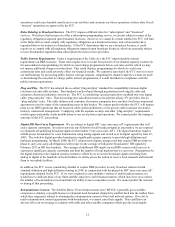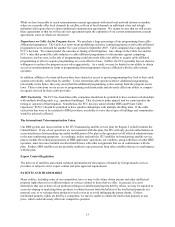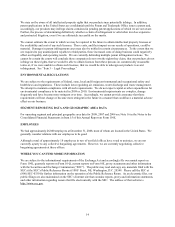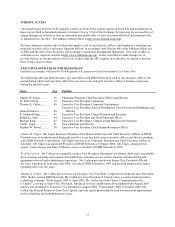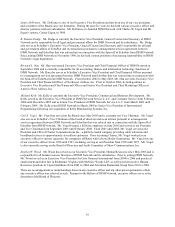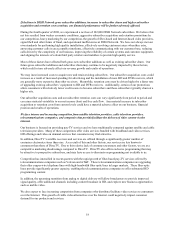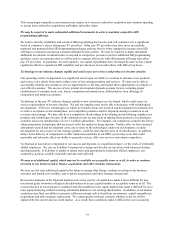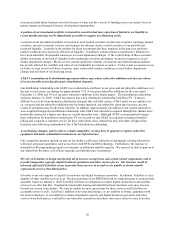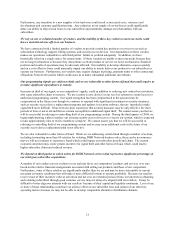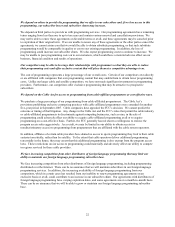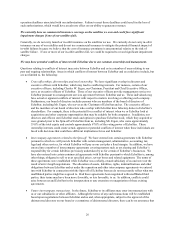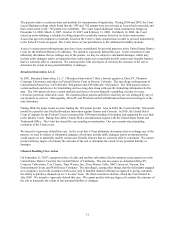Dish Network 2008 Annual Report Download - page 32
Download and view the complete annual report
Please find page 32 of the 2008 Dish Network annual report below. You can navigate through the pages in the report by either clicking on the pages listed below, or by using the keyword search tool below to find specific information within the annual report.22
We depend on others to provide the programming that we offer to our subscribers and, if we lose access to this
programming, our subscriber losses and subscriber churn may increase.
We depend on third parties to provide us with programming services. Our programming agreements have remaining
terms ranging from less than one to up to ten years and contain various renewal and cancellation provisions. We
may not be able to renew these agreements on favorable terms or at all, and these agreements may be canceled prior
to expiration of their original term. If we are unable to renew any of these agreements or the other parties cancel the
agreements, we cannot assure you that we would be able to obtain substitute programming, or that such substitute
programming would be comparable in quality or cost to our existing programming. In addition, the loss of
programming could increase our subscriber churn. We also expect programming costs to continue to increase. We
may be unable to pass programming costs on to our customers, which could have a material adverse effect on our
business, financial condition and results of operations.
Our competitors may be able to leverage their relationships with programmers so that they are able to reduce
their programming costs and offer exclusive content that will place them at a competitive advantage to us.
The cost of programming represents a large percentage of our overall costs. Certain of our competitors own directly
or are affiliated with companies that own programming content that may enable them to obtain lower programming
costs. Unlike our larger cable and satellite competitors, we have not made significant investments in programming
providers. Furthermore, our competitors offer exclusive programming that may be attractive to prospective
subscribers.
We depend on the Cable Act for access to programming from cable-affiliate programmers at cost-effective rates.
We purchase a large percentage of our programming from cable-affiliated programmers. The Cable Act’s
provisions prohibiting exclusive contracting practices with cable affiliated programmers were extended for another
five-year period in September 2007. Cable companies have appealed the FCC’s decision. We cannot predict the
outcome or timing of that litigation. Any change in the Cable Act and the FCC’s rules that permit the cable industry
or cable-affiliated programmers to discriminate against competing businesses, such as ours, in the sale of
programming could adversely affect our ability to acquire cable-affiliated programming at all or to acquire
programming on a cost-effective basis. Further, the FCC generally has not shown a willingness to enforce the
program access rules aggressively. As a result, we may be limited in our ability to obtain access (or
nondiscriminatory access) to programming from programmers that are affiliated with the cable system operators.
In addition, affiliates of certain cable providers have denied us access to sports programming they feed to their cable
systems terrestrially, rather than by satellite. To the extent that cable operators deliver additional programming
terrestrially in the future, they may assert that this additional programming is also exempt from the program access
laws. These restrictions on our access to programming could materially and adversely affect our ability to compete
in regions serviced by these cable providers.
We face increasing competition from other distributors of foreign language programming that may limit our
ability to maintain our foreign language programming subscriber base.
We face increasing competition from other distributors of foreign language programming, including programming
distributed over the Internet. There can be no assurance that we will maintain subscribers in our foreign-language
programming services. In addition, the increasing availability of foreign language programming from our
competitors, which in certain cases has resulted from our inability to renew programming agreements on an
exclusive basis or at all, could contribute to an increase in our subscriber churn. Our agreements with distributors of
foreign language programming have varying expiration dates, and some agreements are on a month-to-month basis.
There can be no assurance that we will be able to grow or maintain our foreign language programming subscriber
base.


